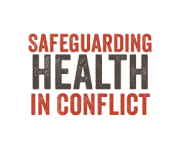
Dear Friends,
Accountability remains one of the greatest challenges in limiting violence against health care in conflict. The problem is well illustrated by recent developments regarding the Saudi-led coalition’s bombing of urban areas—as well as water and sanitation systems—in Yemen, which has severely compromised an already weak health system and contributed to a devastating cholera epidemic.
In August, a report of an expert panel appointed by the UN Human Rights Councilfound that Saudi targeting practices may in some instances amount to war crimes, and that the Saudi-led coalition’s Joint Incidents Assessment Team “lacks independence, its public findings contain insufficient details and that there is no mechanism to ensure implementation of its recommendations.” The US Congress sought some level of accountability by prohibiting military support for the Saudi and United Arab Emirates air campaign unless Secretary of State Mike Pompeo certified that the coalition was taking effective steps to reduce civilian casualties. While it was obvious that these steps were not taken, Pompeo nevertheless issued the certification.
We have to ask whether the oft-repeated commitments to respect for, and protection of health care in war have any meaning when accountability becomes a charade. Still the Safeguarding Health in Conflict Coalition will continue to press the UN Security Council and others for concrete actions, like those found in our 2018 report, to protect health care in conflict settings and to hold perpetrators accountable.
—Len Rubenstein, Chair
Safeguarding Health in Conflict Coalition

